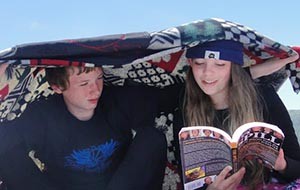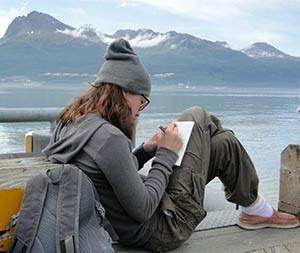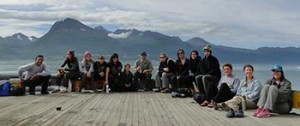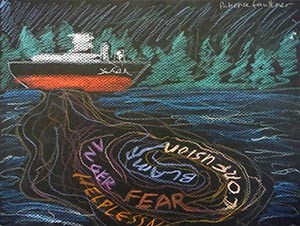By Alicia Zorzetto
Digital Collections Librarian
Students in the annual Copper River Stewardship Program studied the Exxon Valdez oil spill from a different perspective this year. They learned about the spill directly from some of the most affected citizens in the region.
The program, run by Kate Morse, program director for the Copper River Watershed Project, takes youth from the Copper River Basin on a hands-on exploration of their region. During a 10-day trip to various Copper River communities and Prince William Sound they learn about the ecology, culture, economy, and history of the region from individuals representing a wide range of organizations.

This year, Morse added a study of the Exxon Valdez disaster through oral history. Morse had the students listen to recordings from the Exxon Valdez Project Jukebox, the partnership between the council and the University of Alaska Fairbanks, and read excerpts from “The Spill,” the council’s book. From her volunteer work on the council’s Information and Education Committee Morse was familiar with both projects, which documented and preserved stories from local citizens who experienced the Exxon Valdez spill from a variety of viewpoints.
Each student listened, watched, or read the story of someone sharing their first-hand experiences of the Exxon Valdez oil spill, then designed a flag to represent the person’s story based on their understanding and feelings related to the person’s experiences.
Morse said that integrating oral history into this year’s lesson dramatically changed how youth connected with the content and increased what they learned.
 “I do confess it was hard as an outdoor educator to encourage my students to ‘plug in’ and put on ear buds,” Morse said. “However I felt they were more interested in participating because they like to be plugged in.”
“I do confess it was hard as an outdoor educator to encourage my students to ‘plug in’ and put on ear buds,” Morse said. “However I felt they were more interested in participating because they like to be plugged in.”
“The opportunity to hear the first-hand stories while traveling through Prince William Sound engaged students in learning about the oil spill in a very personal way,” Morse said. “Describing the story in a drawing forced students to listen, which reinforced the emotions, and caused the students to retain more knowledge about the event and its aftermath,” added Morse.
“Hearing the sadness in the people’s voices really made me think more of it,” said one of the students.

Towards the end of the week, the group learned about the improvements in oil transportation within Prince William Sound and downstream communities since the oil spill. Jeremy Robida, council staff member, met with the youth to talk about the changes in oil spill prevention and response and how local fishermen are now trained every year by Alyeska’s Ship Escort/Response Vessel System to help respond to an oil spill.
